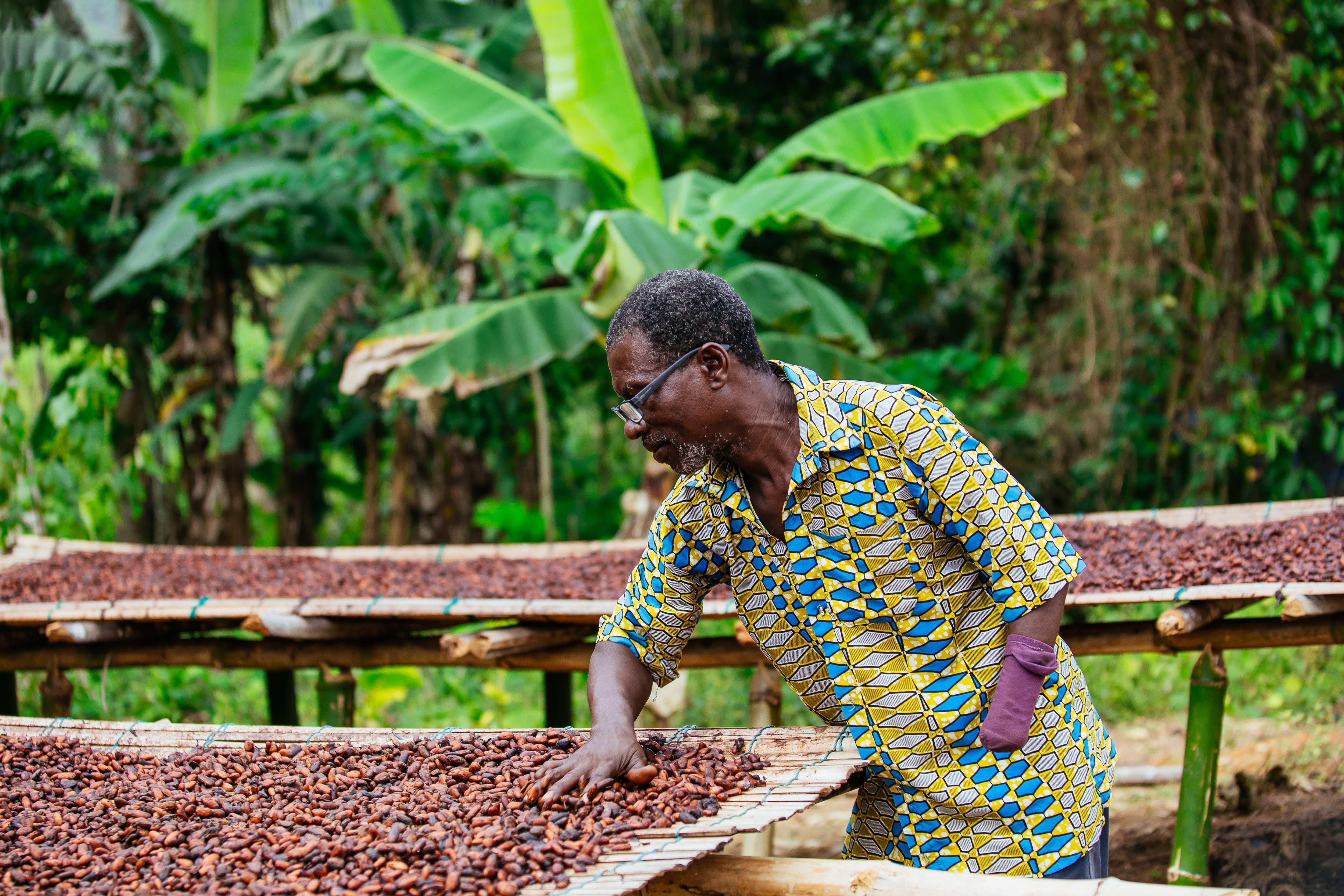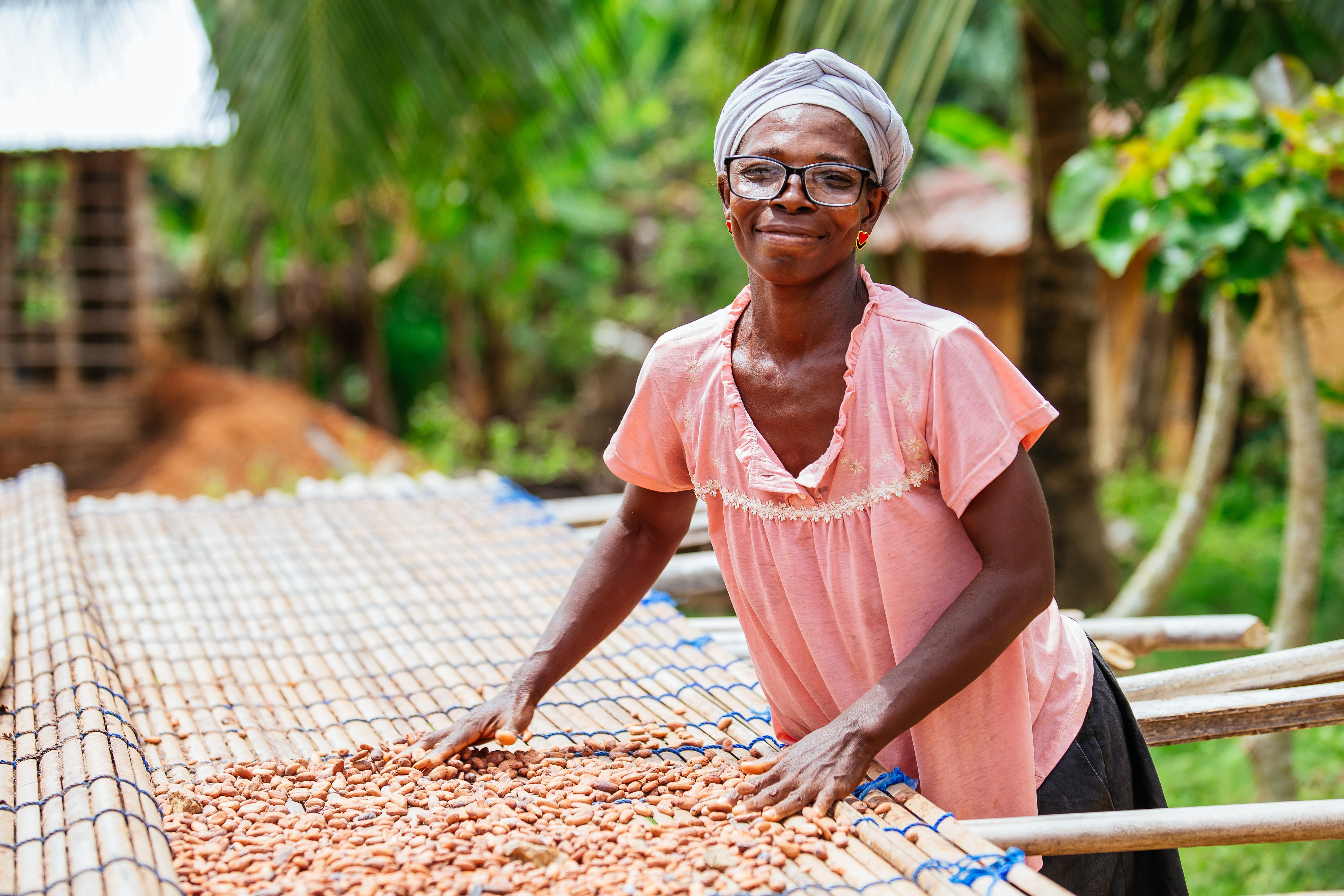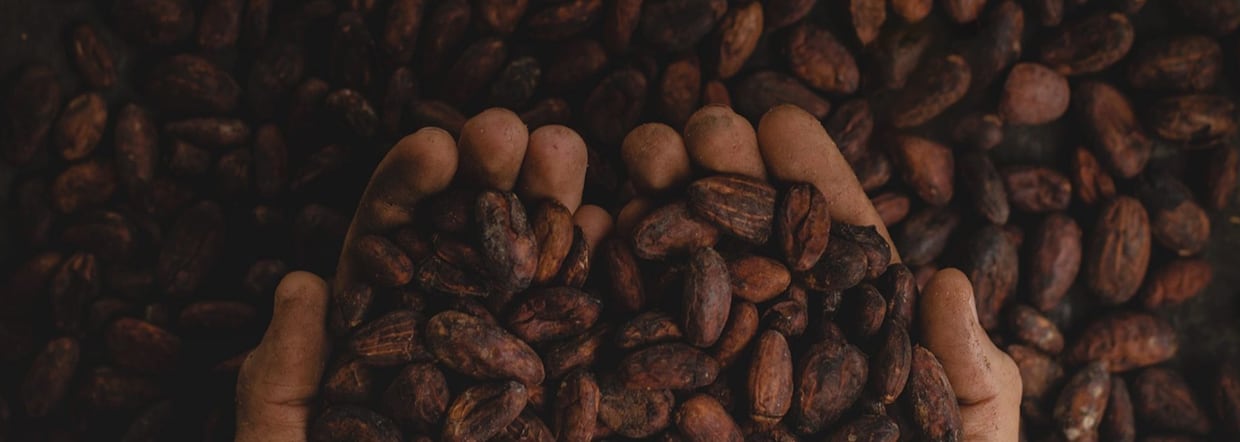Chocolate is one of the world’s most beloved sweet treats.
Its retail sales are over $100 billion across Western Europe, North America and Asia Pacific, accounting for approximately 70% of sales worldwide.¹
However the cocoa industry faces several ethical and sustainability issues, especially in West Africa where Côte d’Ivoire and Ghana produce over 60% of the world’s supply of the commodity.² These include:
- Child labor According to a report by Rainforest Alliance, approximately 1.5 million children partake in cocoa farming in Côte d’Ivoire and Ghana, a result of widespread poverty among farmers who often use their children to work on farms because of financial constraints and cultural norms.³
- Deforestation and biodiversity loss Cocoa farming has been a significant catalyst of deforestation in West Africa. From 1990 to 2015, Côte d’Ivoire lost over 50% of its forest cover, while Ghana experienced an annual deforestation rate of 2%.⁴
- Poverty among farmers According to a report by The International Institute for Sustainable Development, most cocoa farmers receive only about 6% of the retail price of chocolate products, leaving many smallholder farmers in chronic poverty.⁵ Their low income breeds a cycle of low productivity and environmental degradation.
- Gender inequality A significant issue in the cocoa sector is the lack of resources available to female cocoa growers, which restricts their capacity to contribute fully to the nation’s cocoa industry.
- Climate change Cocoa farming is susceptible to climatic conditions such as rainfall and temperature. Unpredictable weather patterns, droughts, and pest infestations significantly reduce the annual yields and long-term viability of cocoa farming.
- Supply chain transparency The cocoa industry’s supply chain is highly fragmented, making it difficult to trace the origins of cocoa beans and adhere to global compliance and ethical standards.
A shift towards sustainable solutions
To help tackle some of the cocoa industry’s significant challenges, prominent industry stakeholders, including government, NGOs and private sector players, are implementing various interventions. For example, the European Union’s Deforestation Regulation (EUDR) is reshaping sourcing practices, and initiatives like the Cocoa & Forests Initiative (CFI), are actively promoting reforestation and the sustainable use of land.⁶
An emerging strategy now focuses on incorporating sustainability with farmers’ wellbeing. Ethical cocoa sourcing models spotlight health, education, and financial inclusion to create a more meaningful impact on farming communities.

Health-driven sustainability in cocoa farming
Similar companies are spearheading health-driven projects and interventions in Ghana as part of sustainability commitments. An example of this health-centred approach is seen in the Apomuden (‘good health’) project driven by cocoa sourcing and marketing company Fludor Ghana Limited (Fludor).
The Apomuden project has recognized the link between farmer health, productivity and, as a result, resilience; it addresses the barriers to healthcare access, particularly in rural cocoa-buying locations throughout Ghana’s major cocoa-producing areas, including Brong Ahafo, Central, Eastern, Western, and Ashanti.
Fludor is a member of the international conglomerate Tropical General Investments (TGI) Group. Since its establishment, it has remained committed to its vision of boosting farmer livelihoods, protecting the environment, and improving sustainable cocoa production in Ghana while advocating for human rights.
Sustainability for prosperity
Sustainability is at the core of Fludor’s operations. It focuses on improving cocoa harvesting communities’ living standards while protecting the environment.
Through a partnership with global social enterprise VisionSpring, Fludor is currently executing the ‘See to Earn Program’, which provides spectacles to farmers and their families. In Ghana, 95% of the population lacks affordable eye care, and this initiative enhances productivity and farmer income potential.⁷
“TGI Group has an excellent track record of partnering with communities where they operate, with a special interest in smallholder farmers and their households, as well as their overall wellbeing. The group believes in an all-encompassing approach to improving livelihoods,” says Dennis Sampong, Managing Director at Fludor Ghana.
“This heritage is the compass of our sustainability activities in Ghana.”
Blueprint for sustainable cocoa production
Fludor’s sustainability program prioritizes farmer health and agricultural productivity, which includes healthy trees, soil, and biodiversity. Under the Apomuden program, 4,805 smallholder farmers have been screened across the 12 cocoa districts, and 2,189 received eyeglasses, 65% of them first-time wearers. Additionally, 964 cases were referred to the hospital for advanced eye conditions such as glaucoma and cataracts.
In Ghana, where access to quality healthcare is a significant challenge, particularly in rural areas, Fludor’s health initiatives are making a meaningful impact. Beyond VisionSpring, the program collaborates with Elucid Social to enrol farmers in Ghana’s National Health Insurance Scheme. As of 2024, 955 individuals across 265 households have gained access to essential healthcare services covering maternal health, emergency care, and preventive treatments.

“Our program is a testament to Fludor’s commitment to the health of farmers, their families, and their communities, as well as the health of cocoa farms and the surrounding natural environment,” says Maria Christodoulou, Head of Sustainability at Fludor.
“This holistic approach, which recognizes the critical link between health and sustainability, ensures that our efforts are both comprehensive and impactful.”
Bringing positive change to communities in Ghana
The impact of Fludor’s sustainability programs is apparent across Ghana. Adimadmin, a cocoa farmer who benefited from the Apomuden Project, shares: “Before this project began, we resorted to herbal medicine. So, when the Fludor representative announced Apomuden, we were excited. Today, I am healthy! Our children were thrilled to hear about this initiative as well. God bless all the partners, and may this good work continue.”
This inspiring story is just one of many that reflect the hope and positive change that Fludor’s initiatives are bringing to communities in Ghana.
A collaborative path forward
The cocoa sector requires a multistakeholder approach to transformation. Sustainable cocoa production is not just about compliance – it’s about creating resilient farming communities. Governments, corporations, and civil society must work together to scale solutions integrating environmental, social, and economic sustainability.
As Fludor looks to the future, the company is poised to expand its efforts and deepen its partnerships, driving continued progress in the cocoa sector.
“It is a pleasure working with Fludor Ghana, a licensed buying company with an open eye for the requirements and obligations for sustainable cocoa of their customers to sustainably produce cocoa. Fludor develops sustainability programs that are beyond the basic legislative requirements in its customers’ home markets,” says Jack Steijn, Director of Equipoise and founder of Behind Chocoa.
“Fludor’s pledge to put the health of people and natural resources central to its approach is groundbreaking and I expect it will bring real benefits for farmers, farmer communities, and the local environment of cocoa production.”
Fludor’s approach is one of many efforts contributing to sector-wide progress. By investing in farmers’ wellbeing, ethical sourcing, and transparency, industry players can achieve a sustainable future for cocoa farming while ensuring equitable benefits for all farmers in the supply chain.
With the ever-evolving scope of sustainability in cocoa production, the collective efforts of programs like Apomuden will set a path to solidify the future of ethical sourcing that will create meaningful change in the industry.
References
- Barry Callebaut. Cocoa Sustainability Guide: Understanding Sustainable Chocolate. (Source: Euromonitor).
- Sustainalytics. Child Labor in Cocoa Supply Chains: Unveiling the Layers of Human Rights Challenges.
- Rainforest Alliance. Rainforest Alliance Certified Cocoa.
- Climate Focus. Supporting Smallholder Farmers for a Sustainable Cocoa Sector.
- IISD. Global Market Report: Cocoa.
- World Cocoa Foundation. Joint action for a deforestation-free future.
- Vision Action. Ghana.


